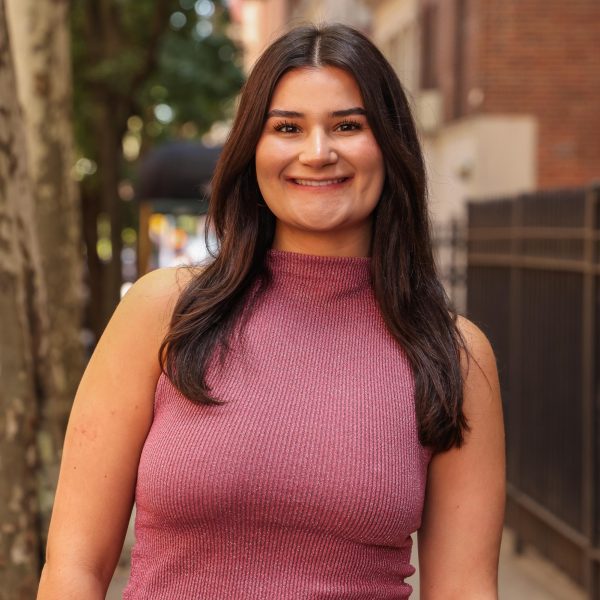Protesters criticize Israeli government’s far-right plans for reform
Protesters convened in Washington Square Park on Sunday morning to oppose the Israeli government’s recent proposal to limit judicial power.
Dozens of protestors gathered at Washington Square Park to take against the far-right Israeli government’s plans to limit the power of the country’s judiciary. (Jason Alpert-Wisnia for WSN)
February 6, 2023
Dozens of demonstrators gathered in Washington Square Park on Sunday, Feb. 5 to protest Israeli Prime Minister Benjamin Netanyahu’s plans to reform the country’s judicial system. Protesters demanded that the proposed policies — which, alongside other changes, would limit the ability of courts to overturn government decisions — not be passed by the Israeli parliament for fear that they would erode the independence of the judiciary and provide opportunities for rights violations.
Netanyahu, who was re-elected as prime minister in November during Israel’s fifth election in nearly four years, has been met with tens of thousands of people protesting in Tel Aviv over the proposed legislation. In 2019, Netanyahu was indicted for bribery and fraud after a three-year investigation. His trial is ongoing.
Noa Fort, one of the protest’s organizers, said she hopes the New York City protest will amplify the voices of Israeli people who are fighting against the perceived power grab by the far-right government.
“It’s really important because people in Israel need to know that they’re being supported by people abroad,” Fort said. “This will hopefully get to international media, and to the knowledge of people in positions of power abroad who we think should stop supporting, with unconditional support, everything that Israel is doing.”
Netanyahu’s reforms, if passed, would allow the parliament to overturn select Supreme Court rulings and grant the government more say in political nominations. His judicial reform also includes a plan to upend Israel’s checks and balances system by giving power to the most right-wing coalition.
Demonstrators had previously staged an anti-reform protest at Washington Square Park on Jan. 28. Fort joined UnXeptable, a pro-Israel advocacy group, in organizing the protest. The group helped arrange similar protests in cities including Boston, Seattle and Washington, D.C.
Former Stern visiting professor Martin Cherkes, who attended Sunday’s protest, said he was concerned that the new policies would concentrate power in the hands of Netanyahu.
“The people who resist this reform are the most productive and the most educated and the most militarily-participating part of Israeli society,” Cherkes said. “It’s the foundation of Israel, and to go and to make the reform against the will of the people — at least 50% of the people — is not a good idea.”
Netanyahu — who previously served two terms as prime minister — included in his administration’s cabinet ultranationalist politicians who want to annex land in the West Bank. The land is currently claimed by Palestinians, and the move may inflame tensions between Jewish and Arab populations, both in Israel and the region as a whole. Israel’s President Isaac Herzog, whose position is largely ceremonial, has joined liberal Israelis in warning the population of the harm Netanyahu’s far-right administration could inflict on the country.
Supporters of J Street, an American pro-Israel organization, were also present at the protest. Mark Lurinsky, a member of the steering committee at J Street’s New Jersey chapter, criticized Netanyahu’s proposed changes in a speech during the protest. He said the changes are the government’s latest attempt to divide citizens over race and religion, a tactic which he believes would only increase violence in the country.
“We are here today to speak for our unconditional support for Israelis who insist on democracy,” Lurinsky said. “The Israeli court system remains one of the most fundamental checks on those in power, and it must be defended.”
Lurinsky also said that Netanyahu’s allies — including Israeli national security minister Itamar Ben-Gvir and finance minister Bezalel Smotrich — are attempting to “undemocratically seize power.” He also criticized the increase in evictions of Palestinians in Israel, as well as the destruction of homes in and expansions of Israeli settlements in the West Bank and east Jerusalem.
Fort added that she thinks Israel’s democracy is currently limited and violates the human rights of Israeli citizens, as well as Palestinians.
“There is an attempt to institutionalize discrimination and racism against groups in Israel including Arabs, immigrants, women and LGBTQ people,” Fort said. “Equality is a fundamental value in democracy, and that is threatened right now.”
Contact Bruna Horvath at [email protected].




























































































































































